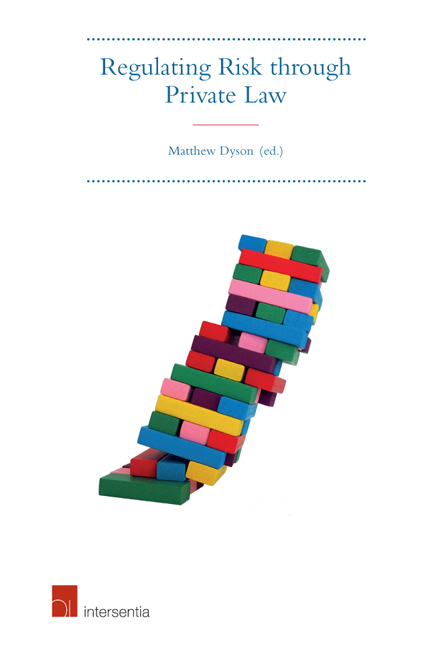Book contents
- Frontmatter
- Preface
- Contents
- Table of Cases
- List of Contributors
- Chapter 1 Introduction
- Part I Risk Overviews
- Chapter 2 Risk and english tort law
- Chapter 3 Risk and French Private Law
- Chapter 4 Risk in Swedish Tort Law: Of Models and Muddles
- Chapter 5 Risk and Italian Private Law
- Chapter 6 Regulating Risk Through Private Law: The Spanish Approach
- Chapter 7 How Dutch Tort Law Responds to Risks
- Chapter 8 Risk and Chilean Private Law
- Chapter 9 Regulating Risk Through Private Law: South Africa
- Chapter 10 Risk and Brazilian Private Law
- Part II State of the national art on risk
- Index
- About the Editor
Chapter 8 - Risk and Chilean Private Law
from Part I - Risk Overviews
Published online by Cambridge University Press: 13 October 2018
- Frontmatter
- Preface
- Contents
- Table of Cases
- List of Contributors
- Chapter 1 Introduction
- Part I Risk Overviews
- Chapter 2 Risk and english tort law
- Chapter 3 Risk and French Private Law
- Chapter 4 Risk in Swedish Tort Law: Of Models and Muddles
- Chapter 5 Risk and Italian Private Law
- Chapter 6 Regulating Risk Through Private Law: The Spanish Approach
- Chapter 7 How Dutch Tort Law Responds to Risks
- Chapter 8 Risk and Chilean Private Law
- Chapter 9 Regulating Risk Through Private Law: South Africa
- Chapter 10 Risk and Brazilian Private Law
- Part II State of the national art on risk
- Index
- About the Editor
Summary
This chapter intends to show that there is no such a thing as ‘a systematic treatment of risk’ across private law’ s principal sources: legislation, doctrine and case law. However, the main contribution of Chilean private law to the conceptualisation, distribution and control of risks takes place in two different contexts, namely contract and extracontractual liability. In this chapter we will focus on extracontractual liability. The appreciation of risks has steadily increased in importance in Chilean society and has thus been subjected to a more sophisticated analysis by experts and regulators. This is reflected in legislation at different levels and in respect of a wide variety of activities with diverse degrees of danger. Yet for all that change, private law remains underdeveloped and inadequate in its treatment of risk. This failure is particularly evident in the limited role played by court decisions in the definition and management of risks. In Chile, judicial decisions are normally where the law in action is found. However, in respect of risk, Chilean case law has been less influential than doctrine and legislation. Rather, judicial decisions seem to confirm that the impact of private law on the conceptualisation, allocation and control of risks is modest. Courts tend only to apply a few abstract rules on extracontractual liability contained in the Civil Code that distribute risks among victims and wrongdoers. Courts usually enforce these default rules without engaging in risk analysis itself. Judicial creativity is scarce. However, the one potential area where judicial development has been engaged is the development of a presumption in case of liability for one's own acts specifically out of article 2329 of the Civil Code, a technique which may hold some hope of judicial contribution in the future.
RISK: CLARIFYING CONCEPTS
Risk, although pervasive in Chilean law, is under-theorised in legal discourse. By and large, the notion of risk is conceived in similar terms across doctrine, legislation and case law. It is generally understood in the most natural or colloquial sense of the term, that is, ‘contingency or proximity to harm’. In turn, contingency is defined as ‘the possibility that something does or does not happen’, danger as ‘an imminent risk or contingency that a mischief occurs’, and imminent as anything ‘that threatens or is about to happen shortly’.
- Type
- Chapter
- Information
- Regulating Risk through Private Law , pp. 195 - 222Publisher: IntersentiaPrint publication year: 2018



